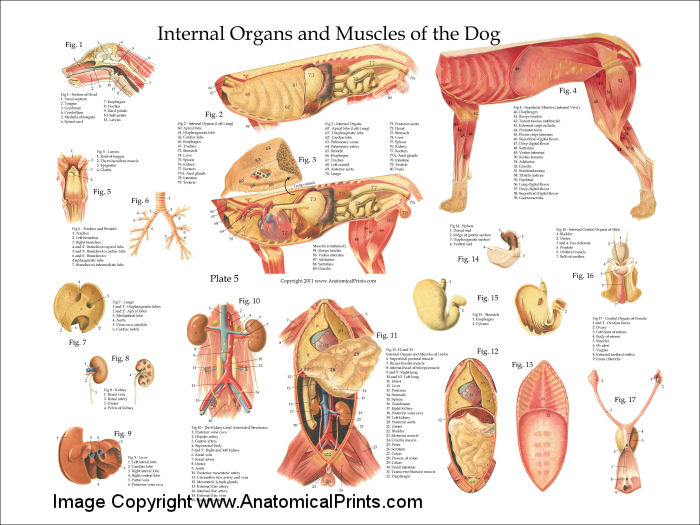
Dog Internal Anatomy Poster
Anatomic Planes. The main planes of motion for dogs are as follows (see Figure 5-1): • The sagittal plane divides the dog into right and left portions. If this plane were in the midline of the body, this is the median plane or median sagittal plane. • The dorsal plane divides the dog into ventral and dorsal portions.
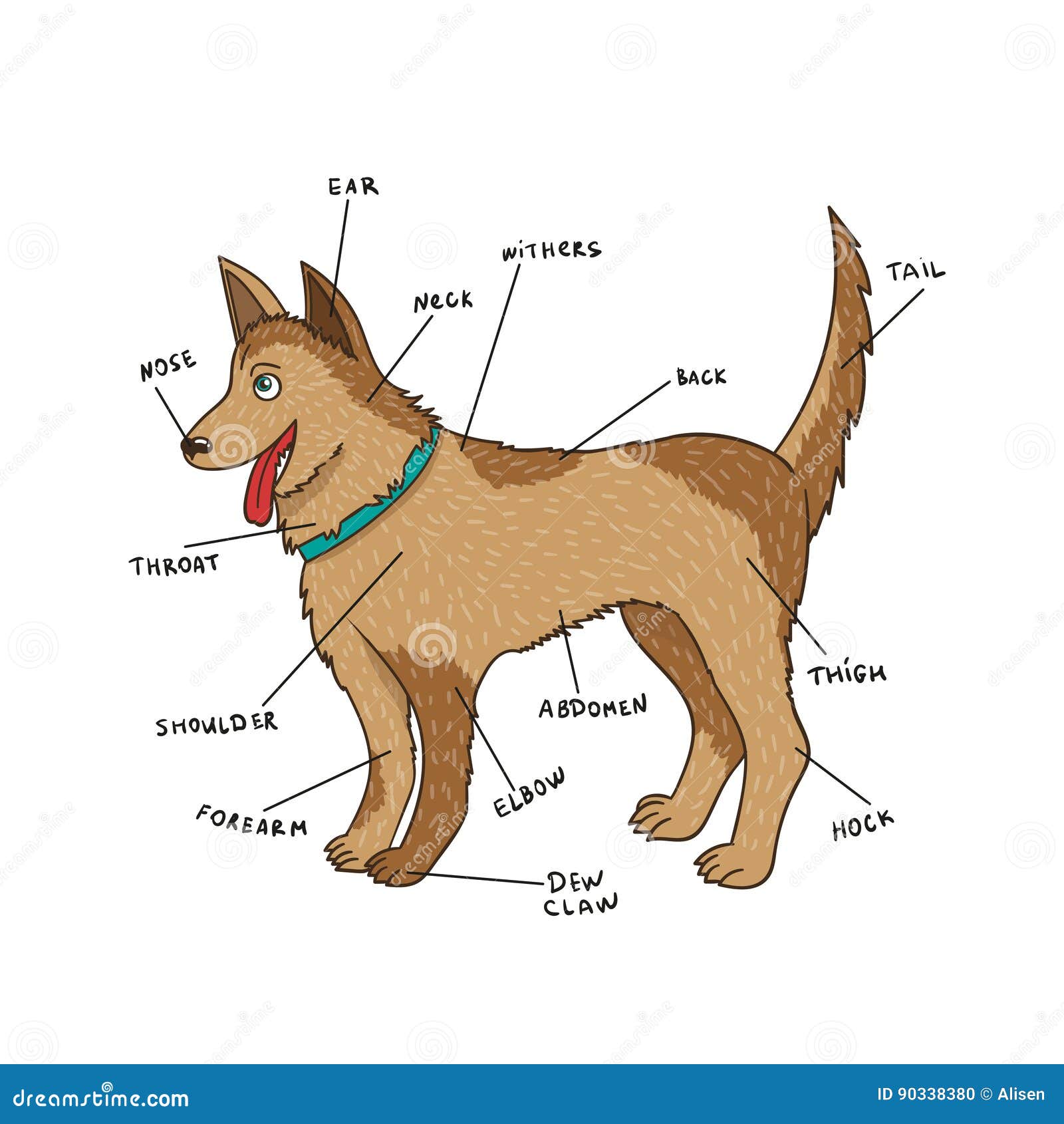
Dog External Anatomy. Puppy Parts on English Stock Vector Illustration of nose, puppy 90338380
Common anatomical terminology Here are some common veterinary terms and their meanings: Pet senses Pets communicate in a very different way than people do. They have the same basic senses like sight, hearing, smell, touch, and taste, but they use them differently to communicate with the world.

"Animal Body Parts" Vocabulary in English ESLBUZZ
A dog's body is comprised of a variety of systems, including the cardiovascular, digestive, lymphatic and central nervous systems.. Body Parts of a Dog By Betty Lewis | Updated September 26, 2017. There are many pieces and parts that make your dog the guy he is. He is a collection of complicated systems that allow him to run, jump and bark.
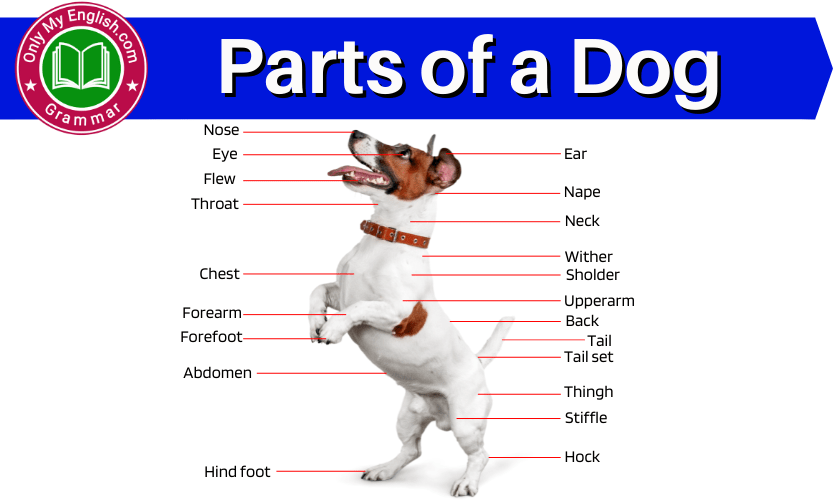
Dog Body Parts Name with Pictures »
We will be covering the most commonly used body parts of a dog, including the abdomen, throat, back, nape, belly, brisket, wrist, chest, prosternum, croup, claw, ear, elbow, and many more. Our aim is to provide you with a comprehensive understanding of the different parts of a dog's anatomy.

Parts of a Dog Useful Dog Anatomy with Pictures • 7ESL
External Anatomy Dogs, like all mammals, have eyes, a nose, a forehead, and ears. The only difference is that their noses are cold and wet, and their ears can be either dropped, erect, or cropped, depending on the breed. They also have a throat, a flew (the upper lip), chest, fore and hind legs, back, stomach, buttocks, and a tail.

Parts of a Dog Useful Dog Anatomy with Pictures • 7ESL
Canine anatomy As we explain above, canine anatomy is far ranging due to the diversity of existing breeds. These different breeds not only differ from each other in size, but in the shape of many body parts. Perhaps the most significant is head shape. There are three main different types of head formation in dogs:

Dog anatomy Royalty Free Vector Image VectorStock
Can you name all of the parts of a dog? Surely you're familiar with common features such as the legs, eyes, and tail… but how about the loin or the hock? Let's review the anatomical terms used to describe the parts of the dogs, starting from head to tail. A Dog's Head Muzzle: The muzzle is also referred to as the foreface.

Dog Anatomy List of Useful Parts of a Dog From Head to Tail Teaching English Grammar, Learning
The dog fibula is a thin, slender and somewhat twisted bone of the dog skeleton anatomy. You will find the enlarged part at both ends of the dog fibula. The proximal part of the body separates from the tibia by a considerable interosseous space. But, the distal part is flattened and closely applies to the tibia bone.
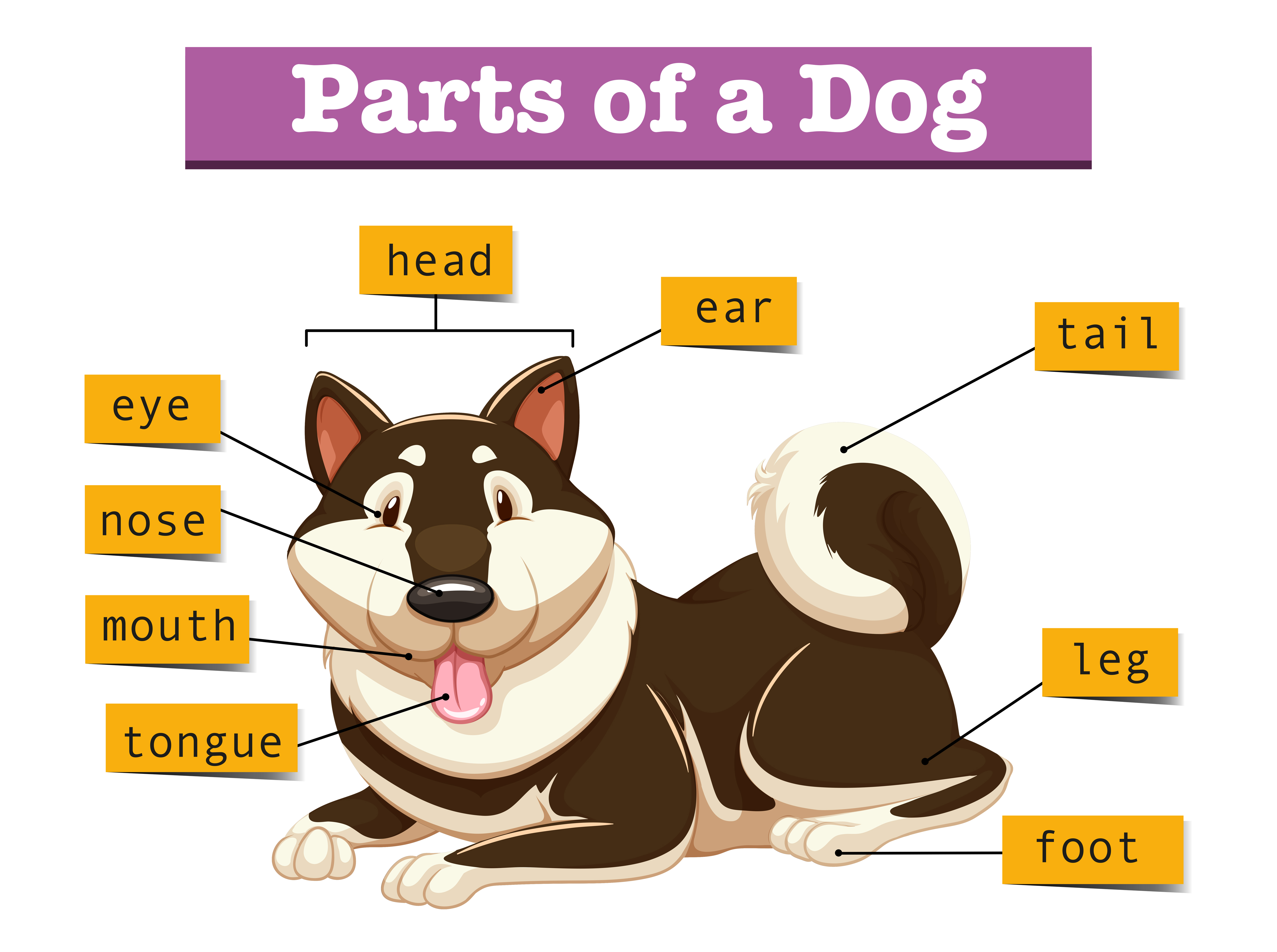
Diagram showing parts of dog 448023 Vector Art at Vecteezy
Diaphragm: The diaphragm is the primary muscle involved in breathing. When a dog barks, it contracts the diaphragm forcefully to expel air out of its lungs and through its vocal cords. Laryngeal muscles: The laryngeal muscles control the opening and closing of the dog's vocal cords, which are located in the larynx (voice box) in the neck.

Dog Body Parts Name with Pictures »
Quick idea: in this article, you will learn the location of different organs from the different systems (like skeletal, digestive, respiratory, urinary, cardiovascular, endocrine, nervous, and special sense) of a dog with their important anatomical features.

Anatomy of dog skeleton with labeled inner bone scheme vector illustration Dog skeleton
Veterinary anatomy - Animal: ANATOMICAL PARTS Abdomen Abdominal aorta Abdominal mammary gland Abdominal mammary region Accessory carpal bone Acromion Adductor muscle Ala of ilium; Wing of ilium Ala of nose Anconeus muscle Antebrachial region Aortic arch Apex of nose; Tip of nose Arm

dogexternalanatomy ESL Buzz
Parts of the neck and shoulders include The nape of the neck is where the neck joins the base of the skull in the back of the head. The throat is beneath the jaws. The crest starts at the nape and ends at the withers (see the last item in this list). The neck is pretty self-explanatory; it runs from the head to the shoulders.
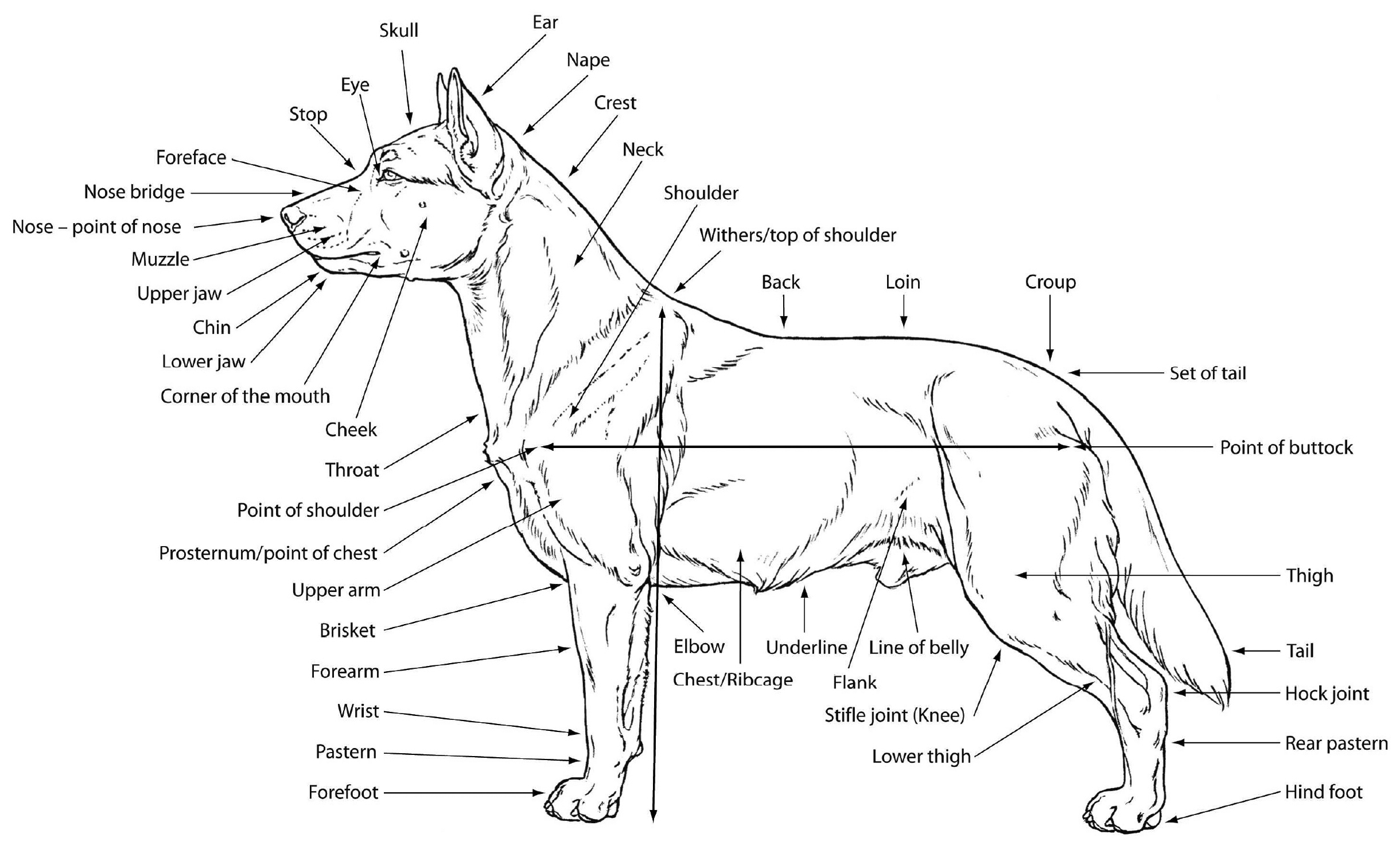
M. Douglas Wray Dog Anatomy
Parts of a dog External body parts of a dog Parts of the dog's head Special features of dog's head Features of the dog neck area Parts of a dog body or barrel Topline of the dog body Different parts of a dog's forelimb Types of dog's forelimb and feet Different parts of the dog hind limb Hock point and Achilles tendon of the dog

Dog Anatomy 40 Popular Parts of A Domestic Dog (with Picture) Visual Dictionary
Summary Anatomy of a Dog Dog anatomy details the various structures of canines (e.g. muscle, organ and skeletal anatomy). The detailing of these structures changes based on dog breed due to the huge variation of size in dog breeds. Would you be surprised to know that short dogs are more aggressive? Or taller dogs are more affectionate?

Female Dog Body Parts Labeled Anatomy Of A Dog 1782934 Vector Art At Vecteezy Parts of a
Pieces & Parts of a Dog. When you look at a dog what do you see? Do you see a big ball of fur or a well-designed animal? Let's look closely at the outside and inside of a dog. Let's start at the head and work our way to the tail. Keep in mind that a dog's physical characteristics often reflect the original job that they were developed to do.
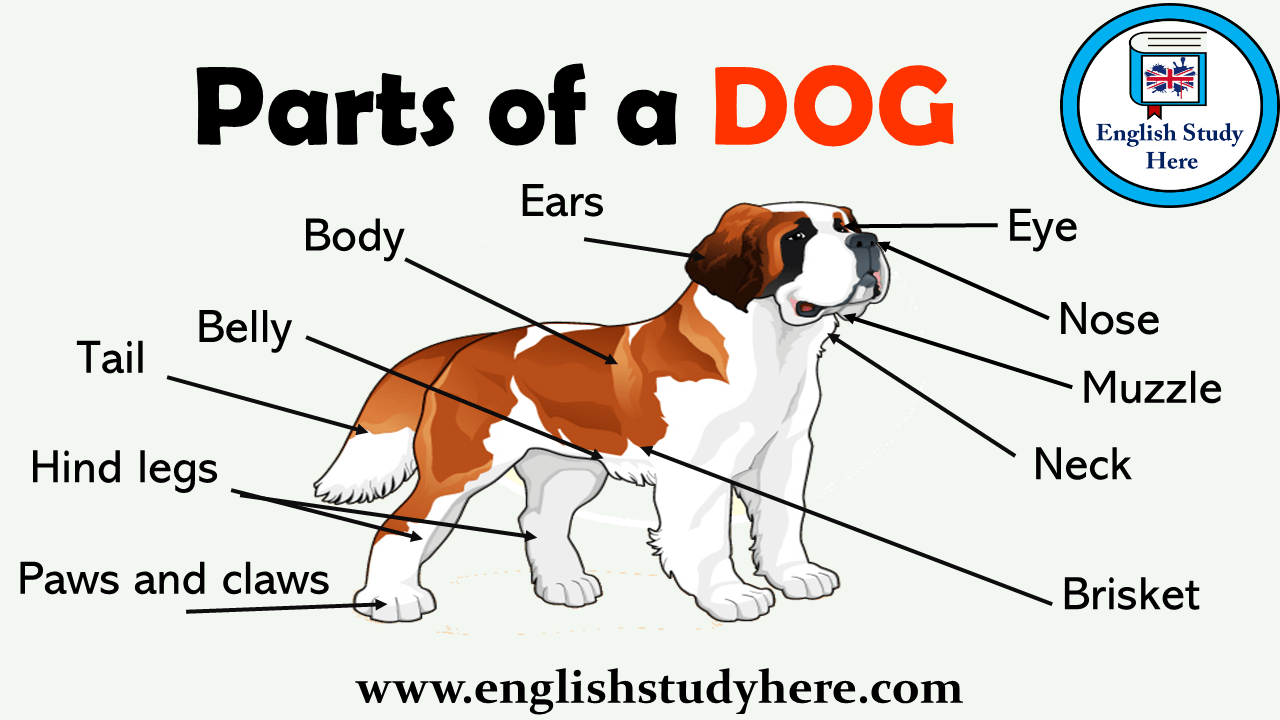
Parts of a Dog Vocabulary English Study Here
Dog anatomy comprises the anatomical studies of the visible parts of the body of a domestic dog.Details of structures vary tremendously from breed to breed, more than in any other animal species, wild or domesticated, as dogs are highly variable in height and weight. The smallest known adult dog was a Yorkshire Terrier that stood only 6.3 cm (2.5 in) at the shoulder, 9.5 cm (3.7 in) in length.